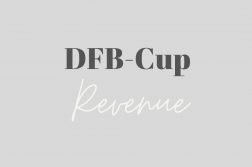Participation in the DFB Cup can play an enormous financial role, especially for the clubs in the lower leagues. More about the financial income possibilities here.
To participate the lower-class clubs first have to be qualifyed for the DFB-Pokal.
Which clubs can participate in the DFB Pokal?
The participants in the DFB Pokal are divided as follows:
- 1. Bundesliga: Rank 1-18: 18 Clubs
- 2. Bundesliga: Rank 1-18: 18 Clubs
- 3. Liga: Rank 1-4: 4 Clubs
- 21 Winners of the “Landespokal” in the Federal States: 21 Clubs
- Bavaria, “Niedersachsen” and “Westfalen” as the biggest federal associations: 3 Clubs
Therefore the 36 professional teams of the 1. Bundesliga and 2. Bundesliga of the past season as well as Rank 1 to 4 in the 3rd league are thus seeded in each cup season.
The national associations (“Landesverbände”) distribute the other 24 starting places.
Initially, 21 starting places are allocated via the cup competitions of the 21 national associations (“Landespokal”).
How do clubs qualify for the DFB Pokal via the competitions of the 21 national associations?
Initially, only clubs from the 3rd division and amateur teams from the lower divisions are eligible to participate in the national cups, with the number of participants varying from one association to another.
Usually the teams of the top leagues (3rd league, regional league (4th league) and Oberliga (5th league) are automatically eligible, while the other clubs of the lower leagues have to qualify via district, county or city cups.
At least in theory, this means that even a district league club can register for the DFB Pokal.
The other three places being awarded as follows:
Niedersachsen: In the 2018/2019 season two cup competitions were held. While in the first competition only the teams from the 3rd league and regional league (4th league) took part, in the second competition all amateur teams below the regional league competed. Both cup winners qualified for the DFB-Pokal.
Westfalen: In addition to the winner of the national cup since 2015/2016, the winner of the deciding match between the champion of the Oberliga Westphalia (5th league) and the best Westphalian team from the Regionalliga West (4th league) also qualifies for the DFB Cup.
In Bavaria, the best placed amateur club from the regional league (4th league) is allowed to participate in the DFB Cup as Bavarian Amateur Champion in addition to the winner of the State Cup.
Second teams of licensed clubs are not eligible to participate in the DFB Pokal matches; if the winner of an association cup is a second team of a licensed club or a team of a club that has already qualified for the DFB Pokal with a team, the next placed and eligible team in the cup competition of the national association shall take its place.
If the champion, the second-, third- or fourth-placed team of the 3rd league is a second team of a licensed club or if the champion, the second-, third- or fourth-placed team of the 3rd league has already qualified for the DFB Pokal via the association cup competition of the respective national association, the next placed and eligible team in the table of the 3rd league or the next placed and eligible team in the cup competition of the national association shall take their place.
The participants at the DFB-Pokal 2019/2020:
1.Bundesliga
- FC Bayern München
- Borussia Dortmund
- RB Leipzig
- Bayer Leverkusen
- Borussia Mönchengladbach
- VfL Wolfsburg
- Eintracht Frankfurt
- Werder Bremen
- Hertha BSC
- TSG Hoffenheim
- FSV Mainz 05
- FC Augsburg
- Fortuna Düsseldorf
- SC Freiburg
- FC Schalke 04
- VfB Stuttgart
- Hannover 96
- FC Nürnberg
2. Bundesliga
- FC Heidenheim
- FC Köln
- FC Magdeburg
- Arminia Bielefeld
- Dynamo Dresden
- Erzgebirge Aue
- FC Ingolstadt
- FC St. Pauli
- Hamburger SV
- Holstein Kiel
- Jahn Regensburg
- MSV Duisburg
- SC Paderborn
- SpVgg Greuther Fürth
- SV Darmstadt
- SV Sandhausen
- Union Berlin
- VfL Bochum
3. Liga (3rd league)
- VfL Osnabrück (Winner)
- Hallescher FC (Rank 4)
- Karlsruher SC (Rank 2)
- SV Wehen Wiesbaden (Rank 3)
- FC Hansa Rostock (Winner Cup in Mecklenburg-Vorpommern)
- FC Würzburger Kickers (Winner Cup in Bayern)
- FC Energie Cottbus (Winner Cup in Brandenburg)
- KFC Uerdingen 05 (Winner Cup in Niederrhein)
- FC Kaiserslautern (Winner Cup in Südwest)
Regionalliga (4th league)
- VfB Eichstätt (Bavarian Amateurchamp)
- Waldhof Mannheim (Runners Up Baden-Cup vs. already qualified Karlsruher SC)
- VfB Germania Halberstadt (als Runners Up in FSA-Cup vs. already ualified Hallescher FC)
- SV Drochtersen/Assel (Winner Niedersachsen Cup)
- FC Viktoria 1889 Berlin (Winner Berlin-Cup)
- Chemnitzer FC (Winner Cup in Sachsen)
- SV Rödinghausen (Winner Cup in Westfalen)
- SSV Ulm 1846 Fußball (Winner Cup in Württemberg)
- FSV Wacker Nordhausen (Winner Cup in Thüringen)
- Alemannia Aachen (Winner Cup in Mittelrhein)
- VfB Lübeck (Winner Cup in Schleswig-Holstein)
- FC Saarbrücken (Winner Cup in Saarland)
- SC Verl (Winner Game Westfalen)
Oberliga (5th league)
- KSV Baunatal (Runners Up in Hessen Cup vs. already qualified Wehen Wiesbaden)
- FC Oberneuland (Winner Bremen-Cup)
- TuS Dassendorf (Winner Hamburg-Cup)
- SV Atlas Delmenhorst (Winner Niedersachsen Cup)
- FC 08 Villingen (Winner Cup in Südbaden)
6. Liga (6th league)
- FSV Salmrohr (Winner Cup in Rheinland)

